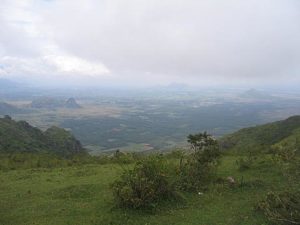The chief executive officer of the Theni District in India’s Tamil Nadu state visited a Paliyan colony on July 24, asked numerous good questions, and made some promises of help from the district government. The unusual aspect of Collector K. V. Muralidharam’s visit was that two of India’s major newspapers, The Hindu and the Times of India, both published reports about the event.

During the 45-minute visit to the Sellayi Colony in Keezha Vadagari, the Collector learned that the 21 Paliyan families—80 people in the colony—had lived in the forests until about 10 years ago when officials asked them to resettle in a new colony on the plains. The Collector visited the home of Karuppiah, a local resident, and asked about the economic activities of the people. He heard the details of their poverty.
The people live in 17 huts built out of sticks, hay and mud, with tarpaulin sheets for roofs. They provide poor protection during the rainy season. Five families live together in one dwelling with bamboo walls separating them. The women do their cooking over firewood in rooms where they also sleep. The dwelling does not have a toilet, so the women have to use a separate sanitary facility. The colony shares the water from a borehole well.
Some of the women venture into the forested hills with the men to help gather honey, collect wild herbal plants, and pick gooseberries. They are able to sell the produce to traders for minimal amounts of money.
One girl in the colony is getting an education. She is attending a government school where she has completed class 11. Karuppiah told his visitor that a few other children are going to a nearby Anganwadi center.
The Collector committed to building more houses for the colony. They should be ready in about 100 days. He said he would consider their request for training in skills that would allow them to get better jobs. At the present time, only five people in the colony earn a daily wage by raising goats. Some people are also employed as night watchmen on properties of private landowners in nearby villages.
As a result of the visit by the Collector, who was accompanied by other officials, Karuppiah expressed hope for the future of the Paliyan people.